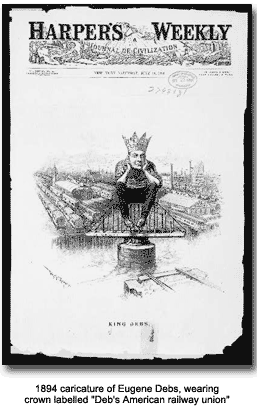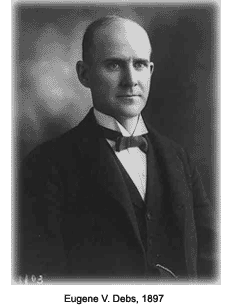Eugene Victor Debs was born in Terre Haute, Indiana. The need for employment ended his schooling at age 14, when he became a fireman on a local railroad. Later he took night classes at the local business college in his spare time.
Giving up his job as railroad fireman in 1874, he took up another job as a billing clerk in the wholesale grocery firm of Hulman & Cox.
 1875 was a busy year for Debs. He became the founder of the local Brotherhood of Locomotive Firemen, and continued to work at Hulman & Cox. Debs used part of his salary to help the fledgling local union, and he conducted its work at night. Later in 1875 he became president of Occidental Literary Club of Terre Haute, to which he invited such famous personages as Colonel Robert Ingersoll, James Whitcomb Riley, Susan B. Anthony, and many others. Five years later he was elected the union`s national secretary-treasurer.
He was also politically active, serving as the town clerk of Terre Haute (1879-83). In 1884, Debs was elected state representative to the Indiana General Assembly as a Democrat representing Terre Haute and Vigo County. He also served in 1885.
The Convention of the Brotherhood of Locomotive Firemen in 1892 persuaded Debs to be the editor of their magazine.
Demonstrating a change in his organizational philosophy, Debs in 1893 became president of the American Railway Union, the first effective industrial union in the United States. The ARU made its mark in 1894 with a successful strike against the Great Northern Railway, when not a wheel moved on the railway for 18 days, until the company finally granted the union`s demands.
On May 11th, 1894 the Pullman boycott and strike in Chicago began, and on July 23rd Debs and the leaders of the ARU were jailed for defying a federal injunction to return to work. In May 1895 Debs and the leaders of the ARU found themselves back in jail, but this time it was for contempt of court in connection with the Pullman strike. While in detention, Debs read widely and was deeply impressed by the writings of Karl Marx. His sentence was finished in November of that year. He emerged from prison convinced that the plight of the worker was most accurately viewed as a class struggle.
Debs supported William Jennings Bryan in the Election of 1896, but turned to socialism the following year. He was a founder of the Social Democratic Party, and later the Socialist Party of America. Debs was the Socialist presidential nominee in 1900, when he ran poorly, and 1904, when he had ran a much stronger campaign.
In 1905, Eugene Debs helped to establish the International Workers of the World (IWW), but soon found the organization too radical for his tastes.
Eugene V. Debs made later presidential runs in 1908, 1912 and 1920, the last of which was his most successful with nearly one million votes. He supported himself during those years with earnings from his writings and lectures. From 1907 to 1912, Debs was the associate editor of Appeal to Reason, which was published in Girard, Kansas. The magazine achieved a circlation of several hundred thousand, due to Debs` powerful writing. Debs also was regarded as one of the most gifted public speakers of his era, rivaling the great preachers and political orators. An example is this excerpt from a speech he gave in Girard, after being nominated for president for the third time:
1875 was a busy year for Debs. He became the founder of the local Brotherhood of Locomotive Firemen, and continued to work at Hulman & Cox. Debs used part of his salary to help the fledgling local union, and he conducted its work at night. Later in 1875 he became president of Occidental Literary Club of Terre Haute, to which he invited such famous personages as Colonel Robert Ingersoll, James Whitcomb Riley, Susan B. Anthony, and many others. Five years later he was elected the union`s national secretary-treasurer.
He was also politically active, serving as the town clerk of Terre Haute (1879-83). In 1884, Debs was elected state representative to the Indiana General Assembly as a Democrat representing Terre Haute and Vigo County. He also served in 1885.
The Convention of the Brotherhood of Locomotive Firemen in 1892 persuaded Debs to be the editor of their magazine.
Demonstrating a change in his organizational philosophy, Debs in 1893 became president of the American Railway Union, the first effective industrial union in the United States. The ARU made its mark in 1894 with a successful strike against the Great Northern Railway, when not a wheel moved on the railway for 18 days, until the company finally granted the union`s demands.
On May 11th, 1894 the Pullman boycott and strike in Chicago began, and on July 23rd Debs and the leaders of the ARU were jailed for defying a federal injunction to return to work. In May 1895 Debs and the leaders of the ARU found themselves back in jail, but this time it was for contempt of court in connection with the Pullman strike. While in detention, Debs read widely and was deeply impressed by the writings of Karl Marx. His sentence was finished in November of that year. He emerged from prison convinced that the plight of the worker was most accurately viewed as a class struggle.
Debs supported William Jennings Bryan in the Election of 1896, but turned to socialism the following year. He was a founder of the Social Democratic Party, and later the Socialist Party of America. Debs was the Socialist presidential nominee in 1900, when he ran poorly, and 1904, when he had ran a much stronger campaign.
In 1905, Eugene Debs helped to establish the International Workers of the World (IWW), but soon found the organization too radical for his tastes.
Eugene V. Debs made later presidential runs in 1908, 1912 and 1920, the last of which was his most successful with nearly one million votes. He supported himself during those years with earnings from his writings and lectures. From 1907 to 1912, Debs was the associate editor of Appeal to Reason, which was published in Girard, Kansas. The magazine achieved a circlation of several hundred thousand, due to Debs` powerful writing. Debs also was regarded as one of the most gifted public speakers of his era, rivaling the great preachers and political orators. An example is this excerpt from a speech he gave in Girard, after being nominated for president for the third time:
The honor to which reference has been made has come to me through no fault of my own. It has been said that some are born great, some achieve greatness, and some have greatness thrust upon them. It is even so with what are called honors. Some have honors thrust upon them. I find myself in that class. 1 did what I could to prevent myself from being nominated by the convention now in session at Chicago, but the nomination sought me out, and in spite of myself I stand in your presence this afternoon the nominee of the Socialist party for the presidency of the United States. Long, long ago I made up my mind never again to be a candidate for any political office within the gift of the people. But I have had to violate that vow, because when I joined the Socialist party I was taught that the wish of the individual was subordinate to the party will, and that when the party commanded it was my duty to obey. There was a time in my life when I. had all the vanities of youth, when I sought the bauble called fame. I have outlived all that. I have at last reached that point when I am capable of placing the right estimate upon my own relative insignificance. I have come to realize that there is no honor in any real sense to any man unless he is capable of consecrating himself to the service of his fellowmen. To the extent that I am able to help others to help themselves, to that extent, and to that extent alone, do I honor myself and the party to which I belong. So far as the presidency of the United States is coneerned, I would spurn it were it not that it conferred the power to serve the working class, and he who enters that office with any other conception of its functions prostitutes and does not honor that office.
 During World War I, Eugene Debs was a highly visible and vocal pacifist. On June 16 of 1918 he delivered a famous antiwar speech in Canton, Ohio. He protested against World War I, which was raging in Europe. He was arrested because of the speech and convicted in a federal court in Cleveland, Ohio, under the wartime espionage law. He was sentenced to serve 10 years in prison and disenfranchised for life — i.e. losing his citizenship. While Debs was serving his sentence in Atlanta, Georgia, his humility, friendliness, and his assistance won him the respect and admiration of the most hardened convicts. Debs ran his 1920 presidential campaign from behind bars. President Warren Harding pardoned Debs in 1921. On December 28th, Debs arrived home in Terre Haute where he received a tremendous welcome from thousands of Terre Hauteans. Ill health prevented him from resuming active participation in politics.
Debs would spend the rest of his life trying to recover his health, which was severely battered while in prison confinement. He still wrote numerous articles and made several speeches, until 1926, when he was admitted to Lindlahr Sanitarium just outside of Chicago. He died there on October 20th, and his body was brought back to Terre Haute for burial.
Eugene V. Debs was regarded by many, perhaps unfairly, as a wild-eyed radical. Socialism and unionism were highly suspect in his day. Debs was a man of great personal charm, who by the end of his life had gained the grudging respect of many of his former opponents.
.
During World War I, Eugene Debs was a highly visible and vocal pacifist. On June 16 of 1918 he delivered a famous antiwar speech in Canton, Ohio. He protested against World War I, which was raging in Europe. He was arrested because of the speech and convicted in a federal court in Cleveland, Ohio, under the wartime espionage law. He was sentenced to serve 10 years in prison and disenfranchised for life — i.e. losing his citizenship. While Debs was serving his sentence in Atlanta, Georgia, his humility, friendliness, and his assistance won him the respect and admiration of the most hardened convicts. Debs ran his 1920 presidential campaign from behind bars. President Warren Harding pardoned Debs in 1921. On December 28th, Debs arrived home in Terre Haute where he received a tremendous welcome from thousands of Terre Hauteans. Ill health prevented him from resuming active participation in politics.
Debs would spend the rest of his life trying to recover his health, which was severely battered while in prison confinement. He still wrote numerous articles and made several speeches, until 1926, when he was admitted to Lindlahr Sanitarium just outside of Chicago. He died there on October 20th, and his body was brought back to Terre Haute for burial.
Eugene V. Debs was regarded by many, perhaps unfairly, as a wild-eyed radical. Socialism and unionism were highly suspect in his day. Debs was a man of great personal charm, who by the end of his life had gained the grudging respect of many of his former opponents.
..